
![]()
Introduction
The visit of 1842-3 (Hechingen)
The visit of 1863 (Löwenberg)
Illustrations
This page is also available in French
We would like to express our thanks to Mr Willy Beyer from Hechingen for providing us with pictures of the Villa Eugenia and a few details concerning Berlioz’s visit.
![]()
Hechingen and Löwenberg are two small towns very far apart at opposite ends of Germany: Hechingen lies in Baden Württemberg east of the Black Forest, nearly 50 kms to the south of Stuttgart, while Löwenberg is in Silesia, about half way between Dresden and Breslau (nowadays Wroclaw in Poland). In Berlioz’s time Löwenberg was in Germany, but after World World II it became part of Poland and is now called Lwówek Ślaski. The connection between these two places, and the reason for grouping them in a single page, lies in Prince Friedrich Wilhelm Konstantin of Hohenzollern-Hechingen (1801-1869), who resided first at Hechingen (down to 1849) and then subsequently moved his residence eastwards to the castle at Löwenberg which he had inherited from his mother. The move from Hechingen was related to the revolutions of 1848, which made the prince surrender his sovereignty as Fürstover his principality to the king of Prussia, the head of the Hohenzollern family; in return he received a lifelong annual pension of 10,000 thalers and the preservation of his title and status.
An almost exact contemporary of Berlioz, the prince was a Francophile: like many members of the cultured German aristocracy of the time he was fluent in French, and was probably a more than occasional visitor to Paris. He was also a music-lover and a composer in his own right. He assembled in his residence at Hechingen a small orchestra and started to develop connections with leading composers and musicians of the day, among them Franz Liszt (Liszt’s connections with the prince then and later are apparently never mentioned in Berlioz’s writings). Whether the prince and Berlioz had actually met before Berlioz’s visit to Hechingen in January 1843 seems unlikely, though they may have heard of each other. In March 1839 the journal La France Musicale reported the foundation of a German musical society; its president was the veteran composer Ludwig Spohr and its patron the prince himself; France was represented by Berlioz, Cherubini, Charles de Bériot and Georges Kastner.
![]()
Berlioz’s growing European reputation evidently preceded his arrival in Germany for his first trip of 1842-1843. While in Stuttgart in December 1842 one of his contacts there, Dr Schilling, an adviser to the Prince of Hohenzollern-Hechingen, suggested to the prince to invite Berlioz to come and conduct a concert of his music at Hechingen. An invitation duly followed, conveyed by the baron von Billing, another adviser of the prince. The trip was brief – Berlioz travelled from Stuttgart to Hechingen on the last day of the year, gave a concert on 2 January, and was back in Stuttgart on the 3rd (Correspondance Générale nos. 794, 795, hereafter shortened to CG). The composer’s correspondence has few details on the occasion (cf. also CG nos. 796, 798bis [vol. VIII], 800), though Berlioz was pleased with his visit: ‘I am back from Hechingen where I had every possible success and was showered with gifts and kind attentions by the prince’, he writes to his friend Auguste Morel on 3 January (CG no. 795). On 6 January he writes to J. C. Lobe in Weimar: ‘I have given a concert here in Stuttgart and another one in Hechingen, and I am very pleased with them as the public seemed satisfied’ (CG no. 798bis [vol. VIII]). The only detail revealed by the correspondence which is not mentioned by the Memoirs is that Marie Recio accompanied him to Hechingen: ‘Pity me, my dear Morel; Marie insisted on singing in Mannheim, Stuttgart and Hechingen. On the first two occasions this seemed bearable, but the last one!… and the mere thought of another singer exasperated her’ (CG no. 800, to Auguste Morel, 16-17 January, from Frankfurt). One particular source of friction at Hechingen may have been that princess Eugenie of Hohenzollern-Hechingen was herself an accomplished singer; it is striking in this connection that Berlioz, who otherwise often commented on the artistic talents of aristocratic women, has nothing to say about the princess in his narrative of the visit to Hechingen. His silence seems suggestive.
Berlioz gave a detailed account of his visit to Hechingen in the second of the Letters in the series Voyage musical en Allemagne which he first published in the Journal des Débats on 20 August 1843. Together with the other letters in the series it was soon republished in the first of the two volumes of Voyage musical en Allemagne et en Italie of 1844, and was eventually incorporated in the posthumous Memoirs. Apart from the silence on Marie Recio, his account provides a lively description of the occasion. Berlioz found the journey there and back through the Black Forest in winter rather depressing, but this was offset by the warm conviviality of the prince’s court. He describes the setting:
[…] Hechingen is just a large village, at most a small town, built on a fairly steep slope, rather like the part of Montmartre which lies at the top of the hill, or better still like the village of Subiaco in the Roman states. Above the town, and located in such a way as to dominate it completely, is the Eugenia villa, which is occupied by the prince. To the right of this small palace, there is a deep valley, and a little further a steep and bare summit with on top the old castle of Hohenzollern, which nowadays is no more than a hunting lodge after having been for a long time the feudal home of the prince’s ancestors.
The present ruler of this romantic landscape is a witty young man, alert and good-natured, whose two sole preoccupations in life seem to be the desire to bestow the greatest possible happiness on the inhabitants of his small states, and the love of music. […] He understands [music] like a poet and a musician; he composes delightful lieder, two of which, der Fischerknabe and Schiffers Abendlied, really touched me by the expression of their melody. He sings them with a composer’s voice, but with a stirring warmth and feeling that comes from the heart and soul. He has no theatre but at least an orchestra, directed by a master of eminent ability, Täglichsbeck, whose symphonies have often been performed with distinction by the Paris Conservatoire. This orchestra puts on for his benefit the most straightforward masterpieces of instrumental music in performances that are plain but carefully prepared. Such is the likeable prince whose invitation delighted me so much and who gave me the most cordial welcome.
The orchestra available was indeed small: in all 8 violins, 3 violas, 2 cellos, 2 double-basses, 2 each of wind instruments, 2 horns, 2 trumpets, a single trombone, and one timpanist. The standard was very uneven, though at least some of the section leaders were capable players. With this unpromising material a concert was nevertheless put together:
[…] With a good deal of patience and goodwill, after arranging and changing certain parts, and with five rehearsals in three days, we put on the King Lear overture, the Pilgrim’s march [from Harold in Italy], the Bal of the Fantastic Symphony, and various other excerpts of a length appropriate for their intended setting. And everything went very well, and was played with precision and even with verve.
[…] After the concert a dinner was given at the Eugenia villa. All the guests were captivated by the prince’s infectious good humour. He was keen to acquaint me with one of his compositions for tenor, piano and cello; Täglichsbeck sat down at the piano, the composer took charge of the singing part, and I was designated by popular acclamation to sing the cello part. The piece was warmly applauded and the peculiar timbre of my high notes provoked almost as much laughter. The ladies in particular could not get over my top A. […]
Both Berlioz and the prince evidently had fond memories of the occasion. The following year, in 1844, Berlioz dedicated his new overture Roman Carnival to the prince (the letters that must have been exchanged on this occasion have not survived). In 1846, while Berlioz was in Prague, the prince, who was clearly kept informed of his movements, sent him a present, as did the emperor of Russia (CG no. 1034, 16 April).
An interesting sidelight on Berlioz’s visit of 1843 is furnished by a notebook, entitled Souvenirs - Bêtises - Improvisations (Recollections, Absurdities, Improvisations), which Berlioz used for his entertainment during his travels between October 1842 and April 1848 and which is now kept in the Hector Berlioz Museum at La Côte Saint-André (see D. Kern Holoman, Catalogue of the Works of Hector Berlioz [Bärenreiter, 1987], p. 251-2; NBE 21 pp. XI, 94-5, 172). One of the pieces in that notebook was written on 3 January 1843. It is a short and humorous sketch of hunting music for oboe and bassoon, with a text in French that contains several untranslatable puns – Berlioz loved plays on words, even of a far-fetched kind. The piece is called ‘Chasse à la grosse bête’ [Hunt for big beasts, with a pun on the expression ‘chercher la petite bête’, which is the equivalent of ‘nit-picking’] for ‘Hautbois et fagot de sapin’ [‘oboe and bundle of fir’] (‘fagot’ – bundle – is a pun on the German word for bassoon, Fagott![]() ). Berlioz adds flippantly: ‘Ça peint la joie ou tout autre chose’ [‘This depicts joy or something altogether different’, but ‘Ça peint’ sounds exactly the same in French as the word ‘sapin’ !] Below the sketch Berlioz adds a few lines:
). Berlioz adds flippantly: ‘Ça peint la joie ou tout autre chose’ [‘This depicts joy or something altogether different’, but ‘Ça peint’ sounds exactly the same in French as the word ‘sapin’ !] Below the sketch Berlioz adds a few lines:
Square inspiration!!
Waldenbuch, Black Forest!
3 January 1843 on the return journey from Hechingen
That day there was in Waldenbuch some rosé wine that was very fragrant, some delicious cookies and two pretty girls whom I did not see but whose melodious songs made me shudder!
Waldenbuch is just south of Stuttgart. The following transcription has been made from the reproduction in Damnation! Berlioz et l’Allemagne [2006] p. 76 (see also NBE 21 pp. 94 and 172). After the last two (silent!) bars Berlioz adds the joke: ‘These last two bars to be well stressed’. In the same notebook is a quotation from the song Le Jeune pâtre breton which is dated 2 January 1843 in Hechingen.
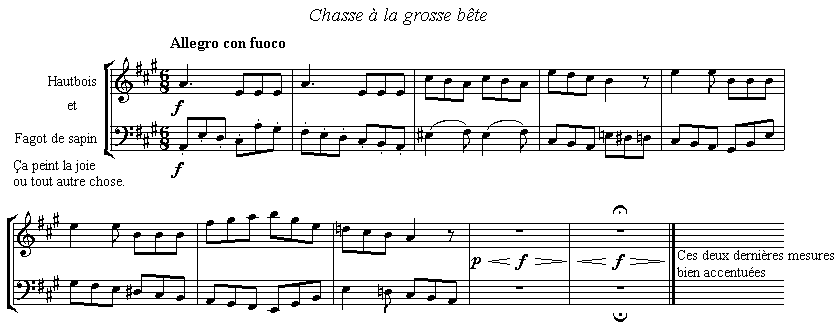
![]() In a letter of September 1855, while serving on a jury for judging musical instruments at the Universal Exhibition in Paris, Berlioz writes (CG no. 2029bis): ‘We have heard 387 pianos, at least 400 brass instruments, without counting bags of flutes, bundles of oboes and other bundles that still go under the vulgar name of bassoons’.
In a letter of September 1855, while serving on a jury for judging musical instruments at the Universal Exhibition in Paris, Berlioz writes (CG no. 2029bis): ‘We have heard 387 pianos, at least 400 brass instruments, without counting bags of flutes, bundles of oboes and other bundles that still go under the vulgar name of bassoons’.![]()
![]()
Though forced to relinquish his residence in Hechingen the prince did not give up his musical interests: if anything the move to Löwenberg provided him with an opportunity to develop what he had started in Hechingen. At his new residence he recruited in 1852 a new, larger and better orchestra which included musicians drawn from the earlier group, notably Täglichsbeck who conducted the orchestra till 1857 and Max Seifriz (1827-1885) who had been among the violins in Hechingen and succeeded Täglichsbeck as conductor in 1857. Liszt played some role in the development of the orchestra; he visited Löwenberg on several occasions in the late 1850s, and there are for example letters from him to Seifriz dating from 1857 and 1859 and one to the prince himself in 1858. Among the players in the orchestra was the celebrated cellist David Popper (1843-1913), whose memories of Berlioz’s visit in 1863 were recorded many years later by one of his pupils (see Stephen De’ak, David Popper, Neptune City, N.J. [1980], p. 64-5).
The orchestra remained a small one (about 50 players in all), but it was of a high standard and contained a fuller range of instruments. It can be assumed from Berlioz’s silence, for example, that the prince made sure it had a cor anglais, essential for several of Berlioz’s scores, including the Roman Carnival overture of which the prince was the dedicatee. In his account of his first trip to Germany of 1842-1843 Berlioz had frequently commented on the absence of the cor anglais from the majority of German orchestras of his day. On the other hand the Löwenberg orchestra still did not have a harp: when Berlioz came in 1863 the harpist Johanna Pohl, wife of Berlioz’s friend and translator Richard Pohl, had to travel with him from Weimar to play the relevant parts (Memoirs; CG no. 2714). The Löwenberg orchestra gave every year a dozen or so concerts to which some 600 music lovers from the region were invited free of charge (the orchestra at Hechingen had seemingly performed only for the prince’s own delight).
Berlioz’s visit to Löwenberg in April 1863 is described in detail both in the Postface of the Memoirs and in the composer’s correspondence; numerous letters survive from this period, and they often relate Berlioz’s experiences in words that are very similar to the Memoirs – this section of the Memoirs was written only a few months later when events were still fresh in Berlioz’s mind. But the account in the Memoirs differs in one respect from the correspondence: it gives the impression that the visit was more effortless and stress-free than was in fact the case.
It was while Berlioz was in Weimar at the beginning of April 1863 directing a production of Beatrice and Benedict that he received an invitation from the prince, conveyed by Max Seifriz, to visit Löwenberg and give a concert there, which he promptly accepted. ‘I have preserved such fond memories of your gracious generosity that I can only fall in eagerly with your Highness’s wishes’, he writes to the prince on 2 April, giving him full authority to draw up the programme himself (CG no. 2707). On 9 April, still in Weimar, Berlioz wrote to his friends the Massarts in Paris (CG no. 2710; cf. nos. 2708-9, 2711-13 with similar information):
[…] The prince of Hohenzollern, who lives at Löwenberg in Silesia, some 300 miles away, is fetching me here to conduct a concert composed of:
The overture King Lear
The adagio from Romeo and Juliet
The festivities at Capulet’s (from the same work)
The overture Roman Carnival
The symphony Harold in Italy
His orchestra knows all these works almost by heart; I will have three rehearsals with the orchestra and everything should go reasonably well.
Look at these princes who give themselves the luxury of having orchestras of sixty players to put on such concerts for their friends! […]
Berlioz travelled from Weimar to Löwenberg on 15 April together with Richard Pohl and his wife the harpist (Memoirs; CG no. 2714) – Richard Pohl also took part in the concert playing the cymbals (he later wrote an account of the visit in his own Memoirs which tallies with the evidence of Berlioz; cf. CG vol. VI p. 413 n. 1). It seems from the wording of the letter quoted above (CG no. 2710) that Berlioz and the Pohls may have travelled in a coach sent to Weimar specially for the purpose by the prince. A few days later, on 18 April and a day before the concert, Berlioz wrote again to the Massarts from Löwenberg with a very full account of his experiences there (CG no. 2714):
[…] I am now in Löwenberg with the prince of Hohenzollern, whom I had not seen again since 1843. Alas! How much has happened in these intervening twenty years! The prince is now impotent and suffers from gout, but he retains his good humour and his love of music seems to have increased. He literally adores me. His orchestra knows all my symphonies and overtures inside out. It is a delightful orchestra of fifty musical musicians [the Memoirs gives the number as 45]. In his castle at Löwenberg the prince has built for himself an exquisite concert hall with a perfect acoustic, with a foyer behind the orchestra, a music library and everything that is required. He has given me a room next to this jewel of a hall, and every day at four o’clock an attendant enters my room to announce that the orchestra is assembled. I walk through two doors to find the fifty musicians motionless in their seats, silent and all perfectly in tune. They stand up respectfully when I ascend the conductor’s desk; I give the first beat and off we go. And how well these fellows perform! Can you imagine that at the first rehearsal they played the FINALE from Harold without any mistakes, and the adagio from Romeo and Juliet without missing a single accent!... The conductor Seifriz told me after this adagio: « Ah! Sir, when we... hear this piece, we... always... in tears. »
Do you know, dear friends, what touches me most in the expressions of affection that I am receiving? It is to see that I am dead. So many things have happened these last twenty years that I have the impertinence to call progressive! My music is being performed almost everywhere.
A master from Breslau has just arrived here; he tells me that his Music Society has performed last month the Queen Mab scherzo, which had the honour of being encored. Another master from Dresden came to Weimar last week and informed me of a number of similar happenings. Fragments of the Requiem were performed in Leipzig a month ago; my Corsair overture is performed everywhere, and yet I have only heard it once. The other overtures, those of King Lear especially and also Benvenuto Cellini, are often performed, and these are precisely the overtures that are least known in Paris. You may laugh or smile, dear madam, but yesterday while conducting the overture King Lear I found myself unable to suppress a tear that wanted to fall from my eyes. I was probably saying to myself that father Shakespeare would not be cursing me for having made his old Breton king and his gentle Cordelia speak in such tones. I had forgotten this overture that I wrote in Nice in 1831.
There was no harp in Löwenberg, so the prince summoned the harpist from Weimar (over 650 km)...
I have been interrupted five times while writing to you. The prince is in bed, incapacitated by gout, and upset at not being able to be present at our rehearsals. At every moment he sends for me; during dinners, to which he kindly invites foreign musicians who have arrived to hear tomorrow’s concert, he writes me notes in pencil which a tall butler in uniform delivers to me on a silver plate, and to which I send my reply between the pear and the pudding (there is no cheese course here) […]. Then I go to spend half an hour at his bedside and he speaks to me!... He knows everything I have written, whether literary works or music. This morning he said to me: « Come, let me embrace you; I have just read your analysis of the Pastoral Symphony… » He dares not get up for today’s rehearsal for fear of a relapse which might prevent him from attending the concert tomorrow. He loves what I love in music and detests what I hate.
Would you believe that the four rehearsals and two performances of Beatrice which I conducted in Weimar have not caused me anything like the same fatigue as the rehearsals for the concert in Löwenberg. I am battered and exhausted. The reason is that a theatre orchestra is a slave, which acts like a slave buried in a pit, while a concert orchestra is a king on a throne. And these great passions of the symphonies stir my emotions rather more brutally than a light opera like Beatrice. […]
Berlioz returned to Paris on 23 April. Letters he wrote on his return add a few more details. He writes to his uncle Félix Marmion on 26 April (CG no. 2715):
[…] There were overwhelming displays of enthusiasm, tears etc. After the first part, on the day of the concert, the prince’s aide de camp walked up to the platform and presented me in the name of his Highness with the cross of the order of Hohenzollern. After the second part, it was the Kapellmeister who offered me a crown on behalf of the orchestra. Renewed applause from the audience, trumpet fanfares. Then the next day another dinner at which I had to reply in French to toasts spoken in German.
The prince has heaped on me every sort of kindness, topped with a serious contribution to my expenses. But this trip has greatly tired me. Directing Beatrice was mere entertainment, but conducting the concert at Löwenberg has overexcited and intoxicated me more than I can say. […]
On the same day to his niece Joséphine Suat (CG no. 2716):
[…] People wept at the scene from Romeo and Juliet, and I myself could hardly tell where I was. When we were rehearsing the overture to King Lear on the first day, a piece I had not heard for fifteen years, I was overcome with a strange emotion. The orchestra was magnificent and obeyed me with electrifying precision. I was saying to myself: What! Did I really write this? But this is tremendous, this is magnificent! […]
All this has cured me of my nervous disorder; since I have gone back to Germany and immersed myself in music all my pains have disappeared. […] (Cf. also CG nos. 2724, 2726)
On 3 May he wrote to the prince himself to enquire about his health and thank him for his kindness (CG no. 2720):
You were very ill when I left you. All the same I have waited until today to ask you for your news, in the hope of increasing in this way my chances of getting better ones. But now I can bear it no longer; I beg you, let me know whether this infernal gout has finally left you, whether you are able to go out and breathe the spring air. You have been so wonderfully kind to me, you combine such a keen and elevated feeling for art with so much intelligence that it is but natural that I should feel for you deep gratitude and the most respectful affection. I have carried out your instructions; you asked me to say to my friends (those who love me) that you love them, and this has deeply moved them. Here I am back in my sad world without music, obstructed as usual at every step forward I want to take. I am bored like the two soldiers who stand guard before the gates of your castle. Yet these two worthy soldiers perform their duty well enough, while in my capacity as critic I am forced to guard the temple of art, but am unable to prevent rascals from depositing their music against its walls. […]
At the end of the account of the visit in the Memoirs Berlioz adds:
I could say a great deal more about this delightful excursion to Löwenberg; suffice it to mention the exquisite grace with which the whole entourage of the prince welcomed me, in particular the family of one of his officers, colonel Broderotti [de Stettmund Brodorotti]. I would add that the Broderotti ladies and the colonel himself speak French with priceless elegance, for I who cannot bear to hear the language badly spoken and do not know a word of German.
At the end of June Berlioz received in fact a letter from the colonel sending the diploma of the order of Hohenzollern and explaining that the delay was due to the prince’s health (CG no. 2740, 25 June):
[…] Fortunately a slow but definite improvement in the health of our excellent Prince allows us to hope that He will soon be fully recovered, and that during Your next visit he will share with us the joy of seeing and hearing You, a memory that is too precious for us ever to be forgotten.
You can imagine that here all the talk is about You, ever since the day when we saw at close quarters the man we admired for so long without knowing him. The whole of our small city feels greater and swells with pride from the day when one of the Titans of music has stayed here – « we too are giants and tall in stature », as we take seriously the proverb « tell me who you frequent and I will tell you who you are ». The appearance in our midst of a great man such as You could not but have a beneficial influence on the few Boeotians who were still impervious to the immense significance of Your music. […]
Berlioz replied warmly a few days later (CG no. 2743, 28 June).
The letter CG no. 2720 cited above is the last known letter of Berlioz to the Prince, but their correspondence continued for some time. There is a letter from the Prince to Berlioz dated 17 August 1864 in which he recommends to Berlioz a musician and composer from Berlin who was visiting Paris, and reaffirms his esteem and respect for Berlioz himself (NL p. 614 no. 2883bis). It is very likely that Berlioz will have replied to the Prince, but his answer has not been preserved.
Other composers apart from Berlioz visited Löwenberg to perform their music. A few months after Berlioz’s visit Wagner himself was in Löwenberg; a letter of his to Mathilde Wesendonk on 15 December alludes to a concert he gave there on 2 December: ‘In Löwenberg I found a very kind man, the prince, who unfortunately is already too old and too worn out to be of use to me’ [In Löwenberg fand ich einen sehr gutmüthigen Menschen, den Fürsten, der bereits leider zu alt, und zu sehr gemissbraucht ist, um mir von Nutzen werden zu können]. In February 1865 Joachim Raff, a protégé of Liszt, conducted in Löwenberg an overture he had written in 1862; it was subsequently published in 1866 with a dedication to the prince. The prince’s health had evidently improved since Berlioz’s visit in 1863: a letter of Louis Berlioz to his father dated 21 January 1866 alludes to the prince’s presence in Paris and assumes that Berlioz will have made frequent visits to him (CG no. 3087; there is otherwise no mention of this in the composer’s extant letters).
Berlioz and the prince died in the same year 1869, Berlioz on 8 March and the prince on 3 September. The prince’s death closed a small but remarkable chapter in musical history: there was no successor who shared his dedication to music and the unique orchestra he had assembled at Löwenberg some seventeen years earlier was disbanded.
![]()
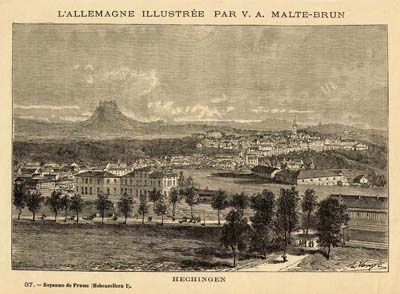
This 1888 engraving is in our collection.
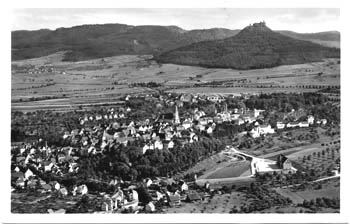
This old postcard is in our collection.![]()
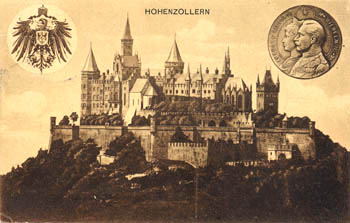
The castle of Hohenzollern was extensively developed after 1848 by the King of Prussia when he took control of it; at the time of Berlioz’s visit it was a much less imposing building, which Berlioz describes as no more than a hunting-lodge.
This 1907 postcard is in our collection.![]()
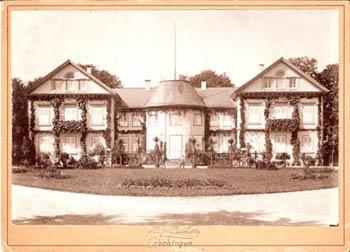
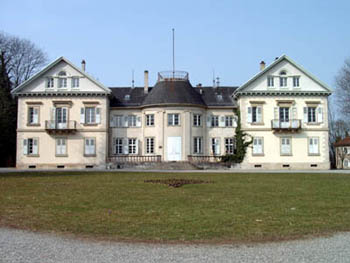
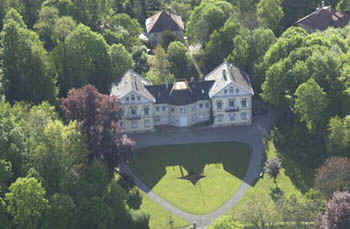
We are most grateful to Mr Willy Beyer for sending us the above three pictures.![]()
![]()
The page Berlioz in Hechingen was created on 3 July 2006; revised on 1 November 2006 and 1 March 2024.
© Michel Austin and Monir Tayeb